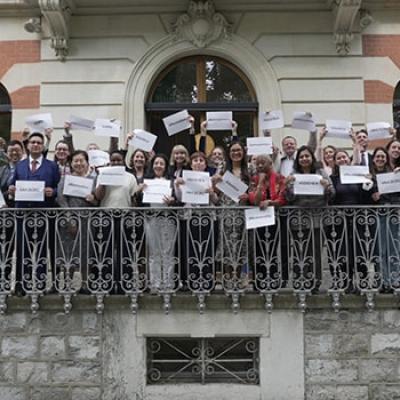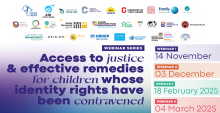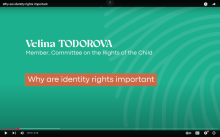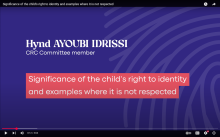“Making sure that every child has a complete identity including birth registration, name, nationality and family relations is what unites and drives the IDRWG to action”
Mia Dambach, Child Identity Protection
KEY FACTS ABOUT THE IDENTITY RIGHTS WORKING GROUP
- The Identity Rights Working Group (IDRWG) brings together more than 25 civil society organisations and international agencies working across child protection and child rights, united by a shared commitment to advance children’s identity rights.
- Members of the IDRWG work in diverse contexts and are connected through the intersecting issues of the child’s right to identity: birth registration, name, nationality, and family relations.
- The IDRWG undertakes joint advocacy, knowledge sharing, and awareness raising work, including direct engagement with UN level human rights monitoring mechanisms such as the Committee on the Rights of the Child and Committee on Elimination of Discrimination Against Women.
- The IDRWG meets regularly online and membership is open to civil society organisations, non-governmental organisations, UN agencies and others who work in the child rights sector.
- The IDRWG prioritises the voices of persons with lived experience to ensure that their viewpoints are central to any initiative
WHAT IS THE IDENTITY RIGHTS WORKING GROUP?
The Identity Rights Working Group (IDRWG), established in 2021, is an informal mechanism for peer learning, knowledge exchange, and joint action in the area of children’s identity rights. For stateless children and children at risk of statelessness, the denial of nationality is itself a violation of their identity rights, while their inability to access legal identity is often a key barrier to accessing other human rights and pathways to secure a nationality. The organisations within the IDRWG are united by a shared vision to strengthen the recognition and prioritisation of children’s identity rights across issues and sectors, including through the framework of nationality rights and the protection of stateless people. The IDRWG leverages the diversity of its membership to advocate for identity rights as a cross-cutting issue, engaging with UN human rights bodies in areas ranging from education, to access to justice to emergency contexts. As a collective voice, the IDRWG fills the gap for coordinated and joined up action on children’s identity as a fundamental and enabling right.
The IDRWG comprises more than 25 civil society organisations, grassroots organisations, non-governmental organisations, and UN agencies working across the child rights sector, and is co-led by the Institute on Statelessness and Inclusion and Child Identity Protection. Its members work on a broad range of child rights issues, with nationality rights and statelessness focused organisations alongside those working on birth registration, family relations, poverty, early marriage, and conflict related sexual violence.
WHY WAS THE IDENTITY RIGHTS WORKING GROUP ESTABLISHED?
The child’s right to legal identity is protected by Articles 7 and 8 of the Convention on the Rights of the Child (CRC). Legal identity encompasses the rights to birth registration, name, nationality, and family relations – all standalone but also interconnected rights under the CRC. Article 8 of the CRC recognises the impact of short or long-term denial of a child’s identity by emphasising the importance of its preservation and speedy restoration in the case of unlawful interference. Without legal identity, children are denied access to the most basic rights, such as health and education, with lifelong impacts, and become increasingly vulnerable to further rights violations such as trafficking, child marriage and recruitment into armed forces.
Marginalised groups such as children living in extreme poverty, stateless children, children born of conflict-related sexual violence, refugees, internally displaced, children living in remote areas, undocumented migrants, and children in street situations are disproportionately at risk of identity rights violations. Children who have been deprived of their family including those in alternative care and/or are adopted as well as those born through assisted reproductive technology are at particular risk of having an incomplete identity in family relations. These diverse groups often face similar challenges on the basis of their lack of identity. However, there has been a relative lack of visibility and coordination around children’s identity as an issue area, prompting the need for a cross-cutting working group.
The primary goal of the IDRWG is to raise the profile of children’s identity rights within the child rights sector, particularly at the UN level and eventually regional mechanisms. It aims to achieve stronger recognition and normative guidance to influence how identity rights are understood, prioritised, and integrated across broader child protection frameworks and policies. The IDRWG works closely with the UN Committee on the Rights of the Child (CRC Committee) through its reporting mandate and responding to calls for input. Its members come together to share knowledge, elevate good practices, and push for stronger, more holistic approaches to protecting every child’s right to identity as outlined in the CRC.
Activities focus on generating dialogue, sharing expertise, and shaping policy through practical, accessible formats. In collaboration with the CRC Committee, the IDRWG has organised several briefings, webinars and expert series, to spotlight emerging issues, lived experiences, and highlight good practices around identity rights. Through its extensive membership, the IDRWG maps opportunities to contribute to policy guidance, written inputs, and joint advocacy to help ground international conversations in the realities children face. These efforts create space for learning, collaboration, and stronger collective action to advance children’s identity rights globally.
HIGHLIGHTS FROM THE IDENTITY RIGHTS WORKING GROUP
Since its inception, the IDRWG has actively convened a wide range of stakeholders — including civil society actors, activists with lived experience, academic experts, practitioners, and UN agencies — through a series of impactful online and in-person events focused on children's identity rights.
The IDRWG has brought together thematic experts to explore children’s identity rights in across a range of topics - including emergencies, education, and access to justice. The group has engaged extensively with UN human rights monitoring bodies in a number of formats including through closed door briefings, expert meetings, public webinars and written submissions. These efforts have contributed to greater visibility on a range of children’s identity rights, including nationality, birth registration, family relations.
Since its inception in 2021, the IDRWG has delivered in-person briefings to key UN bodies, including the CRC Committee and the Committee on the Elimination of All Forms of Discrimination Against Women, helping to elevate the real-world challenges faced by children and presenting lived experiences and case studies to inform their work. In 2022, the IDRWG organised a Symposium on “The Child’s Right to Identity in Emergency Settings” which focused on children’s identity rights in the context of armed conflict and children on the move. In 2023 the IDRWG organised a webinar series that focused on “Addressing lack of access to education for children without legal identity”; and in 2024, the IDRWG held an in-person expert consultative meeting with the CRC Committee to support the Committee in the drafting of its upcoming General Comment no.27 on Access to Justice and Effective Remedies. This meeting was followed up by a public webinar series that mirrored the closed-door consultation, bringing together representatives from the CRC Committee, UN agencies, civil society, and persons with lived experience, to discuss the challenges created by Article 7 and 8 violations in relation to accessing justice. In 2025, the IDRWG also engaged OHCHR by making written submission to the first session of the open-ended intergovernmental working group on an additional protocol to the Convention on the Rights of the Child concerning the right to education.
HOW TO GET INVOLVED IN THE IDENTITY RIGHTS WORKING GROUP
Civil society organisations, NGOs, and UN agencies can express interest in joining the IDRWG by contacting [email protected] or [email protected].
Those interested in learning more about child identity rights can consult the IDRWG briefings to the CRC Committee and CEDAW Committee as well as view resources such as the webinar series on access to justice, education, and emergency settings.
VOICES & EXPERIENCES
-
The Identity Rights Working Group webinar series
![The Identity Rights Working Group]()
The Identity Rights Working Group webinar series
![The Identity Rights Working Group]()
“The webinar series provides a vital platform for social workers and other colleagues in the field to collaborate and innovate. By focusing on identity rights, we are addressing one of the most fundamental issues affecting children today. This work is directly in line with our commitment to the People’s Charter for a New Eco-Social World.”
Priska Fleischlin,
IFSW Global United Nations Commissioner
The Identity Rights Working Group, co-chaired by CHIP and ISI, hosted a webinar series on access to justice for children whose identity rights were violated, following an expert meeting with CRC Committee members, UN agencies, NGOs, academics, and people with lived experience. The series explored challenges when CRC Articles 7 and 8 were breached, showing how lack of legal identity renders children invisible, vulnerable to abuse, and unable to access justice.
Voice from: https://www.ifsw.org/social-workers-champion-childrens-identity-rights-in-new-submission-and-webinar-series/
-
Why are identity rights important?
![The Identity Rights Working Group]()
-
Significance of the child’s right to identity and examples where it is not respected
![The Identity Rights Working Group]()
Latest Resources
-
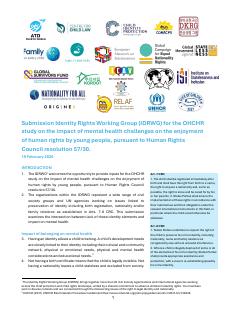
Submission Identity Rights Working Group (IDRWG) for the OHCHR study on the impact of mental health challenges on the enjoyment of human rights by young people, pursuant to Human Rights Council resolution 57/30.
Type of Resource: Report
Theme: Children
Region: Global / Other
View -
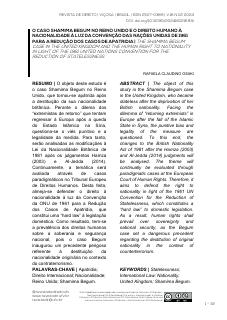
O caso Shamima Begum no Reino Unido e o direito humano à nacionalidade à luz da Convenção das Nações Unidas de 1961 para a redução dos casos de apatridia
Type of Resource: Academic publication
Theme: Nationality Deprivation
Region: Europe
View -
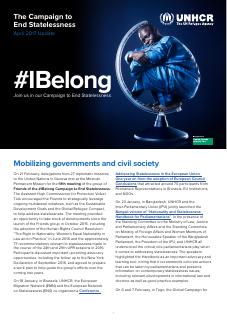
The Campaign to End Statelessness - April 2017 Update
Type of Resource: Briefing / Policy paper
Theme: General / Other
Region: Global / Other
View
